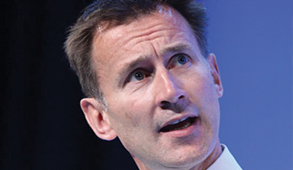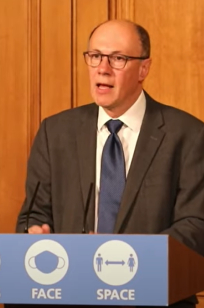MPs ask for waiting list workforce plans
 A Commons Health and Social Care Committee hearing examined how the NHS was preparing to clear the backlog of demand caused by the Covid pandemic. Elective waiting lists have risen over the pandemic period, and at the end of August 5.7 million people were waiting for a procedure. Committee chair Jeremy Hunt (pictured) said that last month the NHS was given additional funding that will flow into the service from April 2022. The government said £9bn over three years would be targeted at waiting lists, creating nine million extra appointments for patients.
A Commons Health and Social Care Committee hearing examined how the NHS was preparing to clear the backlog of demand caused by the Covid pandemic. Elective waiting lists have risen over the pandemic period, and at the end of August 5.7 million people were waiting for a procedure. Committee chair Jeremy Hunt (pictured) said that last month the NHS was given additional funding that will flow into the service from April 2022. The government said £9bn over three years would be targeted at waiting lists, creating nine million extra appointments for patients.
Mr Hunt said delivering this ambition would require additional clinical staff. He repeatedly asked NHS chief executive Amanda Pritchard and NHS England national medical director Stephen Powis how they planned to use the funding to recruit the doctors, nurses and other clinical staff that will be required from April 2022.
The Health Foundation had told the committee that 4,000 doctors and 18,000 nurses would be needed to clear the backlog. Professor Powis agreed that more doctors were needed, but this had to be complemented with measures to retain staff, including offering greater flexibility in working hours and new approaches to career progression, and support their wellbeing.
Ms Pritchard highlighted a number of recruitment and retention schemes. She said the NHS needed ‘trained, supported people’, without which the service would be unable to deliver its ambitions, including those on clearing the elective backlog. Over the last year, the NHS had recruited an extra 29,000 whole-time equivalent staff. Nearly 10,000 of these new staff are nurses and around 3,900 are doctors, she said.
Unsatisfied with their answers, Mr Hunt asked the witnesses to write to the committee, setting out the NHS programmes to recruit and retain staff, how it might impact on staff numbers, and their estimate of the staff needed to clear the backlog.
Turning to next week’s spending review and Budget, the committee chair asked about the potential impact of the settlement for Health Education England (HEE).
‘If that settlement isn’t what it needs to be, it could have a big impact on supply of staff to the NHS. How important is it for NHS England that HEE gets the settlement that allows it to continue to increase the supply of trained staff to the NHS?’ he asked.
Professor Powis said this was ‘absolutely critical’. ‘The training and supply of future clinicians is critical, and it’s really important that we have our mind on the medium- and the long-term as well as the short-term. Unless we get the supply right, we will be in this perpetual circle of worrying about the future workforce.’
Mr Hunt asked if it would be a concern if HEE funding was frozen or reduced. ‘Yes, it would be,’ Professor Powis replied.
‘Anything we can do that gives us greater predictability around the future – the training, the supply side on workforce – would be hugely beneficial,’ Ms Pritchard added.
 Professor Powis (pictured) said the NHS now had ‘certainty of revenue but we don’t have certainty of demand’. The NHS is unable to predict levels of hospitalisation of Covid patients this winter, and how many patients who delayed presenting during the pandemic will now come forward.
Professor Powis (pictured) said the NHS now had ‘certainty of revenue but we don’t have certainty of demand’. The NHS is unable to predict levels of hospitalisation of Covid patients this winter, and how many patients who delayed presenting during the pandemic will now come forward.
He added that more beds are needed, and, in the longer term, the NHS had to ensure there were more single rooms for patients’ dignity and privacy, as well as infection control. Certainty of capital funding, which is expected to be set out in the spending review, would be required to make this a reality, he added.
Looking at the next few months, Ms Pritchard said: ‘We are in for a tough winter. We have 5,900 people with Covid in our beds at the moment and that number is going up. When you add on the impact of reduced capacity and other patients also needing to come forward for treatment, that’s a lot of pressure.’
The NHS was doing all it can to protect elective surgery, she added – creating surgical hubs and community diagnostic centres, for example. ‘We are doing absolutely everything we can to use the money we have as wisely as we can to continue to do the elective work in a protected way, but I think we need to recognise that we are in for a difficult winter.’
Related content
We are excited to bring you a fun packed Eastern Branch Conference in 2025 over three days.
This event is for those that will benefit from an overview of costing in the NHS or those new to costing and will cover why we cost and the processes.